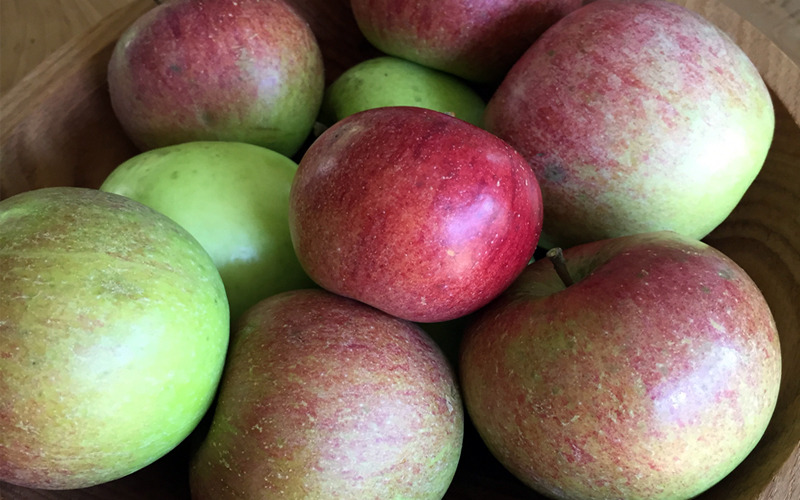
You’re standing in the supermarket. You’re in the produce section looking at apples. Organic and conventional apples are there right next to each other. They look the same. Which one do you pick?
Based on all the questions I get about the price of organic, I’m going to guess many will pick the cheaper apple. We tend to live in micro moments, focused on what’s right in front of us.
For a minute I’d like you to zoom out to the macro. Visualize both those apples and where they came from, how they lived their lives, and the aftereffects of their production on the environment and on you.
First, think about the nature of an apple. It grows on a tree and only ripens once. We want our foods to be local, but if you want that local food to be an apple, you’ve also got to rethink when you eat apples: in the fall.
Second, think about how long those apples have been around. Many apples these days have been bred to have a long shelf life. In the olden days, when flying apples around the world wasn’t an option, people planted apple trees in their backyards. When the fruit was ripe, they harvested, preserved, and made those apples into everything they could think of to keep them for as long as possible. Nowadays, lots of our apples are shipped in from places like New Zealand—where their fall is our spring—so Americans can have fresh apples pretty much year round.
Third, think of how those apples have been farmed. The conventional ones have been sprayed with multiple toxic chemicals, including lots of petrochemicals. All those chemicals seep into our environment and cause long-term health and environmental problems—both locally where the apples are grown, and personally to you when you ingest the apple. The organic apple was grown using non-harmful techniques, ones still based in science, but that don’t leave lasting negative impacts on the environment or your health.
Lastly, think of all the taxes you pay and the charitable donations you might make to groups cleaning up the environment, curing cancer, and making the world a better place. Spending a little more on the organic apple has impacts on all of those things.
That organic apple lives every moment of its lifetime better, so your lifetime will be better for choosing it. The lifetime of anyone who touches that organic apple is also better. And when we think about how we can all leave the world better, magic happens. Life becomes better for everyone.
And if you’re truly worried about whether or not you can afford that organic apple, plant an apple tree. Heck, even if you aren’t worried about the price of an organic apple, plant an apple tree!
And if you want to learn more about growing apples organically, visit the Rodale Institute. This Saturday, September 19, is our Organic Apple Festival (from 10 a.m. to 4 p.m.). Come and pick your own organic apples and feel the difference!




When I look at any fruit or vegetable in the supermarket, I immediately choose organic. Just the thought of biting into a big juicy crisp apple that have been smothered in chemicals, automatically move my hand towards organic! Heck, I just purchased some organic Honeycrisps from Whole Foods, a bit pricey, but worth every cent, judging by the taste and freshness, and of course, certified organic!
Everything I eat now is Organic, if something I want to eat isn’t organic, I don’t eat it, nor do I buy anything not organic. My health has improved in many ways since I went purely organic and even if my pocket book is thinner, my smile is wider and my enjoyment of life is deeper. My heartfelt thanks to everyone who produces anything organic, thanks for saving our earth and our humans!!!
In the “old days,”
Not all apples were picked ripe and immediately made into things. Many apples were known for their keeping qualities, and some were (and are, where they’re still grown), more often eaten late in the season when they were considered to be better. For that matter, many eating varieties aren’t even that old. The apples spread by Johnny Appleseed were by and large inedible; they were used mainly for the production of alcohol.
Apples = REtards